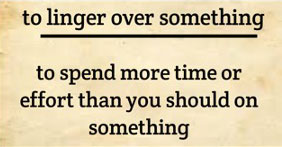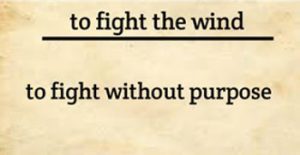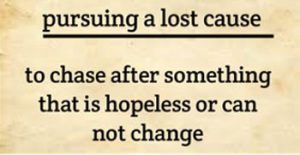To beat a dead horse means to waste time or effort on something that can not be changed or is futile. It can also apply to trying to change an impossible situation.
Once there can be no change made to the situation no matter how much effort you put in, it is considered as beating a dead horse.
Take the idiom literally, no matter how much you flog a dead horse it will stand again. No amount of flogging will bring it back to leave or turn back the hands of time and prevent it from dying.
This idiom originated from the social norm of the mid-19th century when beating horses was acceptable.
The animals were flogged to make them go faster and shorten the time spent on transportation.
For a dead horse, no matter how hard or how long you beat it, it would never move nonetheless faster.
10 Phrases that can be substituted with “beating a dead horse”
- To piss in the wind
- To waste your time
- To linger over something
- Milking the ram/bull
- Pouring water into a sieve
- To fight the wind
- Shoeing the goose
- To feed a fed horse
- Pursuing a lost cause
- Gathering nuts in may
To piss in the wind
The phrase to piss in the wind means to do something that is fruitless and has no chance of succeeding.
No matter how much effort you put in, the situation will remain the same and then you will realize that you have just been wasting your time and whatever resources you put into it.
It’s vulgar slang so if you want to be prim and proper, you had best not use it. This phrase became very popular in the 1600s and although there are many variants of it, they all mean the same thing.
Here’s how to use it in a sentence:
You can try and get him to change his mind, I won’t stop you but you will be pissing I’m the wind because he doesn’t listen to anyone.
To waste your time
Very clear and straight to the point. If whatever you are doing is not productive then you are just wasting your time.
Generally, people say not to waste time because time is life, so if you are wasting time you are wasting life. Here’s how you use this phrase in a sentence:
You will be wasting time trying to please her. She doesn’t care about any of those things.
To linger over something

When you linger on a particular matter or in a particular place, it means that you are spending more time or effort than you should on it.
When you can do nothing about a particular situation the best thing to do is to accept it and find a way forward.
The opposite of this is lingering to see if there is a solution and even if there is none, still staying on that matter.
Here is how to use it in a sentence:
The court is lingering over the evidence brought in by the defending party to pervert justice. It is not constitutional!
Milking the ram/bull
Both animals are male and as such can not produce milk (just putting this out there), so no matter how much you milk them, you won’t get any milk from them.
If you see a friend trying to milk anyone of these two animals you think of him as foolish or dull. We tend this however when we try to influence or alter a situation that can not change.
The ram can never produce milk so no matter how much effort you put in, you won’t get a drop of milk from it.
Here’s how you use it in a sentence:
Sometimes getting Gordon to help is like milking a bull. He doesn’t do anything right and it is so frustrating!
Pouring water into a sieve
An older version of this idiom is “fetching water with a basket”. The nature of a basket won’t let it collect and hold water so it is a fruitless task.
The same with pouring water into a sieve. A sieve is meant to keep solids in and the liquids, like water, out. Pouring water into a sieve, or fetching water with a basket is a good alternative. Here’s how to use it in a sentence:
It’s already late. Trying to find an open shop in time is as good as pouring water into a sieve
To fight the wind

It already sounds silly. The wind is something that you can not control, a natural element that goes as it pleases, or would be really hard to fight it or to even win a fight against it. It is just fighting without purpose.
If it were possible to tame the wind, you would then try to tame the wind to your advantage. That would be purposeful.
Since trying to tame it will only make you look silly, it is considered a very futile thing to do. There are some variants of this idiom.
There’s:
- To flog/beat the wind
- To whistle in the wind
- Plowing the wind
- To spit in the wind
There sure are so many things you can do to the wind that would barely make a difference. Here’s how you use it in a sentence:
That lawyer is fighting the wind trying to get the court to change its verdict
You will be beating the wind if you are planning to borrow from Skinner. He is the most tight fisted person I know, and I know everyone.
Shoeing the goose
The idiom about the goose and the gander is not the only idiom about geese. Geese are wild animals and trying to get them to put on footwear…
I am sure you already know how that goes. Not exactly willing animals. To show the goose is to do something impossible or pointless.
No matter the tactics or strategy you employ you will end up not achieving the result you hoped to achieve. Here’s how you use it in a sentence:
You are better off shoeing the goose than looking for fresh bread to buy at the local market. Nothing there is fresh, nonetheless healthy.
To feed a fed horse
This phrase came around to reduce the violence on animals in certain sayings. With that, “to beat a dead horse” became “to feed a fed horse”.
They might sound similar and the latter, very catchy but they are two very different idioms with different meanings. To feed a fed horse means to waste your time on something.
If the horse is already fed and full, you would be trying to no avail to make it accept food from you. This saying is PETA’s alternative to “to beat a dead horse”.
They strongly believe in being animal friendly and that’s where the phrase originated from. Here’s how to use it in a sentence:
The rumors have spread to everyone in town. Trying to stop them is feeding a fed horse.
Pursuing a lost cause

To pursue a lost cause is to chase after something that is hopeless or can not change. A lost cause means a failed situation.
It can not change no matter what you want to do. For example, if a dog is dead, nothing you can do can bring it back to life.
Or if you burn a book, nothing can reverse the change. Pursuing a lost cause is trying to change what can’t be helped.
This phrase was coined from the Lost cause of the American Civil War. It was how the majority of historians consider it to be a fiction that aims to protect the South’s honor by exaggerating the Confederate defeat.
That said, here’s how it is used in a sentence:
Most of the other courtiers tried to plead with the king to change his mind. He says all we are doing is pursuing a lost cause because this is his way forward.
Gathering nuts in May
This idiom has a very funny origin story. You see, the original saying was “gathering knots in may”. Knots here referred to knots of mayflower that were picked on the eve of the month of May.
But then it became a children’s rhyme and a game and the corrupted version became “gathering nuts in may”. Now if you are not laughing yet, here is a fun fact.
Nuts are picked during autumn. In fact, if you want nuts, you have to beat the squirrels too because when they pick there’s in preparation for the cold months of hibernation.
Here’s how to use it in a sentence:
You can’t plant a flower in December. It’s too cold and there’s no sun. You might as well gather nuts in May.
How to stop beating a dead horse

I am tempted to say put down the cane, go back inside, and plan a horse burial but that’s not it.
When you are faced with a hopeless situation, making efforts in the wrong direction, no matter how great those efforts are, won’t make things better. It might even make things worse.
That said, I have put together a list of steps for how to stop beating a dead horse
- Step 1: Assess the situation
- Step 2: Weigh your options
- Step 3: Find the best possible path
- Step 4: Go for it
Step 1: Assess the situation
Man, I got a dead horse!
When something is going your way, it’s easy to get frustrated, but if you look deeply into the matter without anger or any form of sentiment, you will be able to clearly judge the situation.
Assessing the situation clearly will tell you how bad things are and although you may not know what to do, you will quickly realize what you should NOT do. For example, stop beating the horse.
Step 2: Weigh your options
I can keep beating dead Sally here and miss the fair. I can walk ten miles to the fair, or I can buy a new horse and ride to the fair.
Now that you see there is no use continuing a fruitless line of action, you have to think and weigh the options that present themselves to you.
List them all out no matter how small the change they might make in the situation. It is a sign that you are thinking and deliberating on a solution. That is a way forward.
Step 3: Find the best possible path
Well, it would be foolhardy to walk ten miles or keep beating dead Sally, so I suppose I will get myself a new horse. Then I can go to the fair in style.
From the options you have listed, choose the best option. When choosing this option, you can consult a friend or anyone you trust that will help you make a good decision.
Consider factors like the resources you will need in deploying that solution and the constraints with the advantages you will get.
Putting all this together will help you make a decision you won’t be proud of.
Step 4: Go for it
I got my horse. To the Merrywood cowboy fair Rosie. I gotta show you off. Gallop as fast as you can.
What makes a plan successful is the fact that it’s carried out. If you get this far and you don’t implement the plan you have chosen, you will go back to beating the horse or just wailing about your woes.
It may not be something you can accomplish in a day but start making efforts, one step at a time to reach your goal and the problem is an issue of the past.
Parting Words
Interesting read you will agree? These phrases will have you sound unique and distinct, good riddance to the old saying.
For the steps, generally, these work in any situation. They might not be that easy to implement but a good attempt should set you on track.